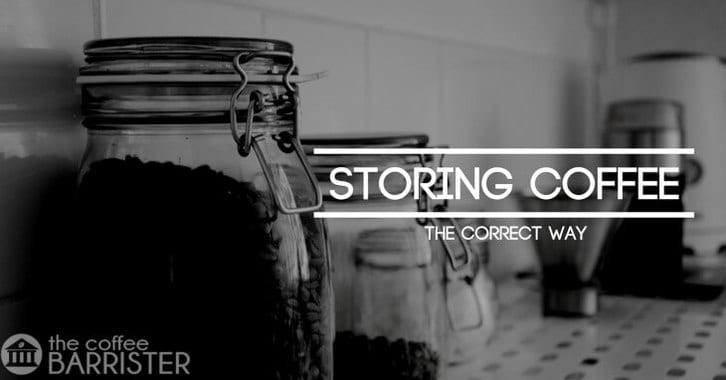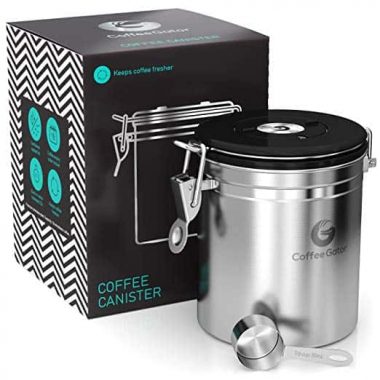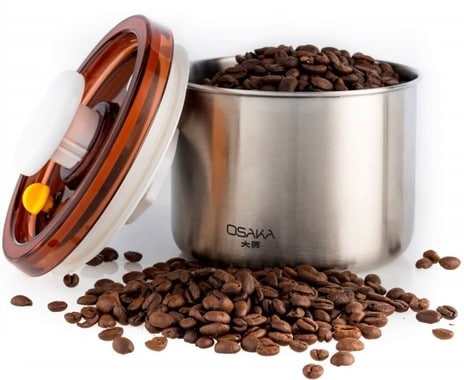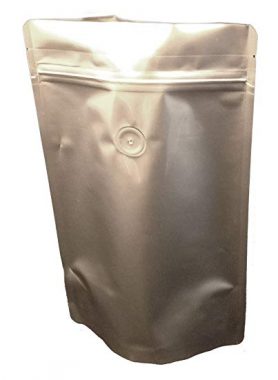
What You'll Learn in This Article
- How to store coffee efficiently – is it better to keep them as whole coffee beans or coffee grounds?
- What to consider when storing coffee?
- What are the best containers to store coffee in at the moment?
- How to store coffee in a freezer effectively?
How Should I Store Coffee: Whole Beans or Grounds?
In essence, if you want to enjoy coffee in its freshest state, you should roast coffee beans yourself. According to Tim Thomson, that’s because green coffee beans can last for up to two years if you store it in a dry place.
I know that’s too much hassle or work for most people. The next best option is to purchase freshly roasted coffee beans from a reputable roaster. It’s best to buy coffee beans in small quantities because they only last around a week or two if you store them properly in an airtight container.
To capture all the coffee’s taste and aroma, you should store them as whole beans and not grind them until you brew. The reason is that coffee beans typically lose around 60% of its flavors within 15 minutes after grinding them.
Make sure to keep your coffee grinder clean, you don’t want to mix your fresh coffee grinds with the stale grinds that might be trapped inside between the burrs.
Don’t have a coffee grinder yet? Not to worry, check out our comprehensive guide for more information.
Why Do Coffee Go Bad So Quickly?
According to Kaladi Coffee Roasters, your coffee drinking experience is composed of three components; they are body, taste, and aroma. When we are talking about coffee going bad, or flavors deteriorating, we’re mainly referring to the aroma that dissipates after roasting.
The aroma dissipates because of the carbon dioxide (CO2) trapped inside. CO2 plays a vital role in retaining the bean’s natural oils and flavor; it acts as a layer of protection around the surface of the coffee, and protects the volatile compounds that give coffee its flavors.
When you grind the coffee, it releases CO2, which also unleashes the bean’s delicious aroma. The aroma of coffee is composed of over 1000 chemical compounds, with around 8/10 being volatile. When CO2 escapes, the beans will come into contact with air and undergo something called oxidation. Oxidation is where electrons move from one compound to another – which the aroma to evaporate or become rancid.
Storing Coffee Beans - Key Considerations
According to the National Coffee Association, the correct way to store coffee beans is to keep them in an airtight container at room temperature. To preserve the freshness even further, I’ll go over what to do in slightly more detail:
- When you store coffee, even though they may look nice in a glass jar, they deteriorate faster when they’re exposed to sunlight. As such, it’s better to store the jar in a cupboard and for safety measures, in an opaque container that uses materials such as ceramic or metal.
- Keep your storage container far away from the stove or other heat sources. This is because heat speeds up the process of air oxidation, which causes your beans to lose its flavors faster.
- Store your coffee beans away from sources of water, steam, or condensation. This includes areas near a sink, a kettle, or in the fridge. Any contact with moisture will initiate the flavor extraction ahead of time, which creates an undesirable brew when you really need it. Overall, the best place to store coffee is in your freezer or cupboard.
- As said already, when coffee comes into contact with air, oxidation occurs. As such, you want to make sure your coffee container is hermetically airtight, like the specialized coffee containers that I’ll go through in the next section.
What's the Best Way to Store Coffee?
The Coffee Gator Coffee Canister is made from stainless steel and can protect up to 1lb (450g) beans or ground coffee from the four elements that ruin its flavors. This coffee canister also has a one-way valve which allows the carbon dioxide (CO2) to escape without letting air in. There is even a handy date wheel on the lid to help you keep track of when it’ll expire.
The Osaka Vacuum Sealed Canister is a large container that comes with a built-in hand pump that lets you remove all the air inside before twisting the lock to seal it. It comes with an indicator that shows when all the air has been removed and also air has leaked back in over time.
Remember to put ground coffee into a bag within the container before using the vacuum pump.
Top 3 Coffee Storage Solutions
From personal experience, we recommend these coffee storage solutions:
Should I Store Coffee in a Fridge or Freezer?
As we’ve discussed earlier already, heat affects the rate of oxidation, so perhaps keeping coffee in a cooler place may be a good idea. However, storing coffee in a fridge is NOT one of them. The fridge’s temperature is not cold enough to slow the process by much. It’s also inherently a wet environment, and since coffee is a deodorizer, it will absorb the smell of everything else inside the fridge and contaminate its original flavors. As such, even in an airtight container, the fridge is not a good place to store your coffee.
Alright, the next on the list is freezing coffee. Although there are those in favor and those against this practice, there is little actual evidence that suggests freezing coffee degrades its flavors. There are growing numbers of roasters who freeze their beans right after roasting and market it frozen. According to Emily McIntyre, Catalyst Coffee Consulting, the main argument against freezing coffee is due to the risk of moisture. When the beans are frozen, they form cracks, and if it happens, the moisture could change the natural internal balance of flavors found in a freshly roasted bean.
Erin Meister, cooking adventure blogger, experimented on the subject of storing coffee and found:
- Coffee brewed from beans stored at room temperature taste consistently better than those stored in a freezer.
- Both whole coffee beans and ground coffee taste better if they’re stored in airtight bags with a CO2 escape than a basic Ziploc one.
However, Ken Fox from Home-Barista found no statistical difference when experimented between frozen and fresh beans. He also claims that freezing beans in a very cold freezer shortly after roasting can keep the beans fresh for at least two more months.
Freezing Coffee - Tips & Tricks
- If possible, use a chest freezer instead of a fridge freezer because you won’t open them as frequently; this reduces the risk of condensation forming.
- Separate your coffee beans into smaller bags like the High Barrier ones. Normal Ziploc bags allow air and pollutants to pass through, which would affect the brew’s overall performance.
- For safety measure, you should consider putting your coffee bag inside another seal-able bag or container to reduce the risk of contamination even further.
- Do not re-freeze after thawing. By changing temperature again and again, it’ll definitely form cracks and allow moisture to build up inside.
Overall, does freezing coffee affect its flavors? It’s debatable. In theory, I believe it does. However, since the effects are so small, it’s difficult to distinguish it even for those with a developed palate. As such, if you don’t have time to buy fresh roasted coffee beans all the time, you should just follow my tips and tricks on how to store coffee beans properly in a freezer.








